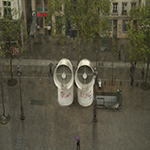Euroacademia Conferences
 Europe Inside-Out: Europe and Europeanness Exposed to Plural Observers (9th Edition) April 24 - 25, 2020
Europe Inside-Out: Europe and Europeanness Exposed to Plural Observers (9th Edition) April 24 - 25, 2020 Identities and Identifications: Politicized Uses of Collective Identities (9th Edition) June 12 - 13, 2020
Identities and Identifications: Politicized Uses of Collective Identities (9th Edition) June 12 - 13, 2020 8th Forum of Critical Studies: Asking Big Questions Again January 24 - 25, 2020
8th Forum of Critical Studies: Asking Big Questions Again January 24 - 25, 2020 Re-Inventing Eastern Europe (7th Edition) December 13 - 14, 2019
Re-Inventing Eastern Europe (7th Edition) December 13 - 14, 2019 The European Union and the Politicization of Europe (8th Edition) October 25 - 26, 2019
The European Union and the Politicization of Europe (8th Edition) October 25 - 26, 2019 Identities and Identifications: Politicized Uses of Collective Identities (8th Edition) June 28 - 29, 2019
Identities and Identifications: Politicized Uses of Collective Identities (8th Edition) June 28 - 29, 2019 The European Union and the Politicization of Europe (7th Edition) January 25 - 26, 2019
The European Union and the Politicization of Europe (7th Edition) January 25 - 26, 2019 7th Forum of Critical Studies: Asking Big Questions Again November 23 - 24, 2018
7th Forum of Critical Studies: Asking Big Questions Again November 23 - 24, 2018 Europe Inside-Out: Europe and Europeanness Exposed to Plural Observers (8th Edition) September 28 - 30, 2018
Europe Inside-Out: Europe and Europeanness Exposed to Plural Observers (8th Edition) September 28 - 30, 2018 Identities and Identifications: Politicized Uses of Collective Identities (7th Edition) June 14 - 15, 2018
Identities and Identifications: Politicized Uses of Collective Identities (7th Edition) June 14 - 15, 2018
The Paris Home and European Space ca. 1945-1965
-
-

-
Presentation speakers
- Hugh McDonnell, Independent Scholar
Abstract:
Today ‘Europe’ is commonly conflated with European political integration, evoking inter-state summits or the machinery and regalia of Brussels. Meanwhile terms like ‘European values’ are often taken as self-evident. Yet, a certain poverty of geographical and historical perspective obscures the fact that there are many versions of Europe and many understandings of Europeanness, which are articulated or manifest themselves in many different spaces and differently over time. This paper, then, looks at the home in Paris in the two post-war decades as a particularly propitious example of the varying, and indeed conflicting or contradictory, understandings of what Europe and Europeanness have been taken to mean. Moreover, the Paris home offers a particularly propitious vantage point to grasp shifting articulations of notions of Europe and Europeanness with those of France and Frenchness, including presuppositions as to their relationship with Republicanism, universalism, postcolonialism and cosmopolitanism. Accordingly the reconfiguration of the urban space of Paris in the wake of the experience of the Second World War, and its impact on the habitability of the city, is examined as an exercise that was undertaken with Europe as a guiding standard. The dual affective and concrete senses of home were particularly relevant in regard to the influx into metropolitan France of both European Algerians and Algerian Muslims. Europe and Europeanness are identified as key terms in the attempt to rationalise their absorption into Paris and to manage their accommodation. Different registers of Europeanness are further explored as terms of ethnicisation of more and less desirable inhabitants in the city, and which impacted especially on Algerian immigrants. Furthermore, discourses of Europeanness and non-Europeanness are analysed in terms of their application to devalue areas of the city populated particularly densely by these North Africans, above all the city’s shantytowns.
-
Related Presentations

















